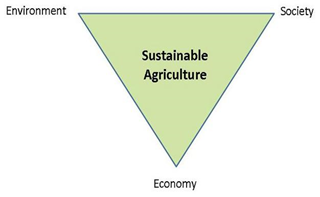Mains Daily Question
Feb. 17, 2021
- What do you understand by the term 'sustainable agriculture'? Suggest strategies to make agriculture in India sustainable.
Approach:
- Introduce with explaining sustainable agriculture
- Suggest various strategies like appropriate production systems, ZBNF etc.
- Conclude appropriately
Sustainable agriculture is that form of agriculture which attempts to produce sufficient food to meet the needs of the present without compromising the ability of future generations to meet their own needs, say by exhausting soil fertility or irreversibly damaging the environment. It integrates three main goals - environmental health, economic profitability, and social equity.
Strategies That Can Be Used To Make Agriculture Sustainable:
- Appropriate production systems: A shift in policy for agricultural production system to match the agro-ecological resources is critical for sustainability. For example, promotion of dry land agriculture rather than input-intensive farming in arid and semi-arid areas and promoting less water-intensive crops like pulses and millets. Similarly, crops like rice needing large amount of water can be shifted to other regions that are relatively more endowed with water.
- Poly-cultures and Crop Rotation: Moving farmers from mono-cultures to poly-cropping and the rotation of crops can lead to reductions in the need to apply fertilizers and pesticides. Such diverse systems are likely to be more productive, labour intensive and provide enhanced ecosystem services and, therefore, much more sustainable.
- Emphasis on nurturing the soil: Greater emphasis on nurturing the soils rather than plants will provide higher benefits on sustaining yields, improving ecosystem health and sequestering carbon.
- Promotion of Zero Budget Natural Farming: Initiatives such as Zero Budget Natural Farming, with low external input and production costs, could help restore ecosystem health and diversified livelihoods of smallholder farmers.
- Reducing Food waste and promoting sustainable consumption patterns: To reduce food wastage, greater investments are needed in improving post-production infrastructure, including storage space in rural areas, and improved harvesting techniques and transportation.
With growing population, depleting resources and the increasing threat of climate change, it will be impossible to fulfill the needs of the future unless we transition to sustainable food and agricultural systems that would ensure world food security, provide economic and social opportunities, and protect the ecosystem services on which our future depends.


